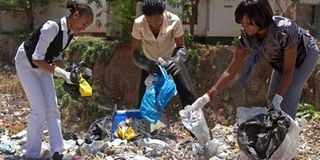What would a plastic-bag-free Kenya be like?

Environmentalists collecting plastic bags. Plastic bags have been banned by the Kenyan government. PHOTO | FILE
What you need to know:
- Should the ban be executed as planned, Kenya will soon be like Rwanda, a country that banned plastic bags nine years ago.
- Kenyans who have been to Rwanda paint a rosy picture of how impeccable the tiny country’s streets look, and those who spoke to nation.co.ke said banning plastic bags in Kenya will be a welcome relief.
That the recent ban of plastic bags is a subtle re-election campaign promise by the Jubilee administration cannot be ruled out, given that the implementation date is after the August 8 General Election.
Nevertheless, there is a lot to be optimistic about after the March 14 gazetting of the ban by Environment Cabinet Secretary Judi Wakhungu, where she specified which type of bags will not be allowed. Many hope that this time round, the ban will have an impact unlike the three previous attempts.
Should the ban be executed as planned, Kenya will soon be like Rwanda, a country that banned plastic bags nine years ago.
Kenyans who have been to Rwanda paint a rosy picture of how impeccable the tiny country’s streets look, and those who spoke to nation.co.ke said banning plastic bags in Kenya will be a welcome relief.
“The streets are so clean that when you come back here, you will shed tears because of the garbage in the streets,” said Ms Susan Muumbi, who visited Rwanda in 2013 and 2016.
“Even at the Rwanda outlets of Nakumatt supermarket, where I have done my shopping, they pack your goods in paper bags. I wonder why Nakumatt can’t introduce those in Kenya. They are quite clumsy to carry but it’s worth the hassle,” Ms Muumbi added.
SURREAL LEVELS OF CLEANILINESS
Ms Anita Chepkoechwas in Kigali in July 2016 and she describes the cleanliness levels in the streets as surreal.
“Rwandan officials check you at the border to make sure you don’t go in with any polythene wrappers,” she said. “Rwandans often carry their own bags, mostly khaki and sisal bags, when going for shopping to avoid buying one each time.”
Ms Chepkoech noted that in case someone had luggage that was too heavy for a paper bag, then cartons would be used.
Canadian journalist Émilie Clavel visited Rwanda in 2013 and later described how officials at the Kigali International Airport confiscated some of her belongings because she had packed some of her items in plastic bags. She wrote of her experience on the Telegraph website, describing how a change in attitude brought about the transformation.
“Knowing it lacked the basic facilities to sustainably manage plastic waste, Rwanda devised a clever strategy to turn the ban into a boost to its economy. The authorities encouraged companies that used to manufacture plastic bags to start recycling them instead by providing tax incentives,” Ms Clavel stated.
“The policy also created a market for environmentally friendly bags, which were virtually non-existent in the country before the ban. Now in its sixth year, the policy has proved efficient, if not perfect,” she added in the 2014 article.
Still on matters of policy, an activist in Nairobi has questioned the Environment ministry’s strategy to phase out plastic bags, warning that it could fail again.
FLOPPED BEFORE
Mr George Mahinda, in a statement to newsrooms on Friday, said a number of previous efforts had flopped because of bad decisions by various parties and that the latest one risks failing too.
“If you are banning the plastic bags used extensively in the economy, it’s important to offer alternatives and I have not heard of any. The alternatives being offered by the Kenya Association of Manufacturers are the same ones offered in 2007 and I wonder if there has been any engagement for the last ten years,” stated Mr Mahinda, who says he is expert in sustainable solid waste management.
In 2005, the Mwai Kibaki administration came up with a 10-point plan which it believed would address plastic waste, but it failed. Then in 2007, the then Finance Minister Amos Kimunya banned the manufacture of plastic bags below 0.3 millimetres in thickness, which did not work. In 2011, the National Environmental Management Agency banned polythene bags of thickness below 0.6 millimetres, which also backfired.
“The debate seem to follow the same script and I wonder whether we learnt any lessons and if there has been any new developments that should inform the debate,” said Mr Mahinda.
The drive towards a region free of plastic bags is also being championed by the East African Legislative Assembly, which is currently collecting views from member states on a Bill seeking to abolish the bags all over the region.





